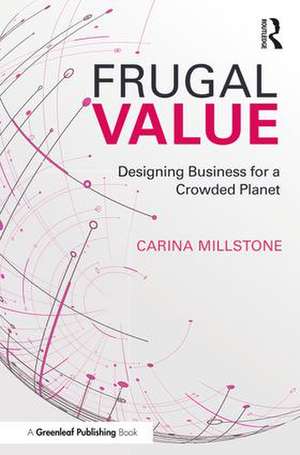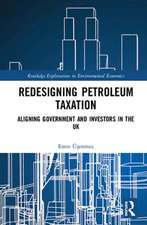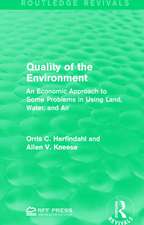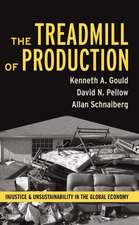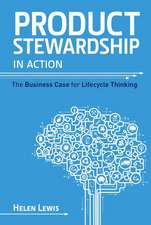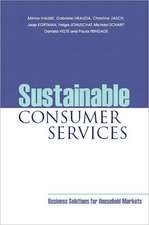Frugal Value: Designing Business for a Crowded Planet
Autor Carina Millstoneen Limba Engleză Paperback – 4 iul 2017
Frugal Value contests the notion that companies can rise to the great challenges of our time by adopting so-called 'sustainable business' practices. Instead, the acute ecological crisis requires an all-round rethink of what business does, and how it does it. This book explores what business responsibility looks like today, and how it could be put into practice through far-reaching changes to companies, ranging from new approaches to product design and business models to reconfiguration of operations and innovative ownership structures.
Frugal Value provides practitioners and scholars with the perspective and tools they need to design companies that help drive the socio-economic changes so urgently required for a sustainable and just world.
| Toate formatele și edițiile | Preț | Express |
|---|---|---|
| Paperback (1) | 317.48 lei 6-8 săpt. | |
| Taylor & Francis – 4 iul 2017 | 317.48 lei 6-8 săpt. | |
| Hardback (1) | 553.02 lei 6-8 săpt. | |
| Taylor & Francis – 5 iul 2017 | 553.02 lei 6-8 săpt. |
Preț: 317.48 lei
Nou
Puncte Express: 476
Preț estimativ în valută:
60.76€ • 62.77$ • 50.57£
60.76€ • 62.77$ • 50.57£
Carte tipărită la comandă
Livrare economică 26 martie-09 aprilie
Preluare comenzi: 021 569.72.76
Specificații
ISBN-13: 9781783533381
ISBN-10: 1783533382
Pagini: 220
Dimensiuni: 156 x 234 x 19 mm
Greutate: 0.32 kg
Ediția:1
Editura: Taylor & Francis
Colecția Routledge
Locul publicării:Oxford, United Kingdom
ISBN-10: 1783533382
Pagini: 220
Dimensiuni: 156 x 234 x 19 mm
Greutate: 0.32 kg
Ediția:1
Editura: Taylor & Francis
Colecția Routledge
Locul publicării:Oxford, United Kingdom
Public țintă
Postgraduate and Professional Practice & DevelopmentCuprins
Introduction: The Failure of Sustainable Business
The Crowded Planet
Chapter 1: The Economy-in-Planet
Chapter 2: The Transition to the Economy-in-Planet
Part 1: Products and Services
Chapter 3: The Purpose and Design of Products
Chapter 4: Properties of Efficient and Sufficient Products
Part 2: Activities and Business Models
Chapter 5: Product Stewardship
Chapter 6: Product Access
Part 3: Operations and Supply Chains
Chapter 7: The Case for Proximity and Appropriate Scale
Chapter 8: The Case for Worker-Centeredness
Part 4: Ownership Structure, Financing and Legal Form
Chapter 9: The Problem with Shareholdership in the Legacy Economy
Chapter 10: Ownership by Workers, Beneficiaries and Investors
Part 5: The Purpose, Scope and Limits of Business
Chapter 11: Profit, Financial and Worthwhile
Chapter 12: Lifestyle Creation, Through Business or Otherwise
Conclusion: What Would it Take to Make Frugal Value Possible?
The Crowded Planet
Chapter 1: The Economy-in-Planet
Chapter 2: The Transition to the Economy-in-Planet
Part 1: Products and Services
Chapter 3: The Purpose and Design of Products
Chapter 4: Properties of Efficient and Sufficient Products
Part 2: Activities and Business Models
Chapter 5: Product Stewardship
Chapter 6: Product Access
Part 3: Operations and Supply Chains
Chapter 7: The Case for Proximity and Appropriate Scale
Chapter 8: The Case for Worker-Centeredness
Part 4: Ownership Structure, Financing and Legal Form
Chapter 9: The Problem with Shareholdership in the Legacy Economy
Chapter 10: Ownership by Workers, Beneficiaries and Investors
Part 5: The Purpose, Scope and Limits of Business
Chapter 11: Profit, Financial and Worthwhile
Chapter 12: Lifestyle Creation, Through Business or Otherwise
Conclusion: What Would it Take to Make Frugal Value Possible?
Notă biografică
Carina Millstone is a UK-based sustainability professional and campaigner. She founded The Orchard Project and currently serves as the Executive Director of Feedback Global.
Recenzii
'Millstone silences the happy talk about business sustainability and brings the sustainability concept down to earth, literally. Brilliantly, she shows what sustainability truly requires for both individual businesses and for the economic system as a whole. Persuasively argued and well written, Frugal Value is a path-breaking synthesis that deserves an audience far beyond the business community.'
James Gustave Speth, former Dean, Yale School of Forestry and Environmental Studies, and author of America the Possible: Manifesto for a New Economy
'Ambitious, serious, and inspiring. At last someone’s asking the right question. What will it really take to get business on a sustainable path? Millstone's unsparing critique of what passes today for "sustainable business" will provoke furious debate; her alternative lays out an agenda for business to become a real force for good. Required reading.'
Paul Gilding, Former Executive Director of Greenpeace International
'A well-informed and forthright challenge to conventional wisdom. Love it or hate it, just read it! This is the spirited debate we need today.'
Ken Webster, Head of Innovation at the Ellen MacArthur Foundation
'Corporate sustainability has made some progress over the last two decades, but nothing like enough. Carina Millstone's insightful book calls time on the 'business case rationale' for companies trying to do the right thing, and urges instead a more radical 'moral case', based on new design and operational principles.'
Jonathon Porritt, Founder Director, Forum for the Future
'Frugal Value reminds us that sustainability - despite its widespread abuse as a concept over the past 30 years - remains non-negotiable. The Planet cannot be 'traded off' for profit any more than oxygen can traded off for food. Frugal Value is a wake-up call to business leaders and sustainability practitioners alike: neither the 'business case for sustainability' nor current 'sustainable consumption and production' practices will get us anywhere near to the biodiverse and ecologically secure future we need to survive and thrive. Millstone calls attention to the elephant in the room - the current failure of so-called sustainable practices - and with skillful analysis, sketches out a more ambitious, transformational path: the imperative of redesigning our economic system and business models to achieve frugal value.'
Professor Wayne Visser, PhD, author of Sustainable Frontiers
'This tough-minded book isn’t afraid to cast aside the cherished shibboleths of sustainable business. It asks the hard questions, and points the way forward with challenging answers.'
Professor Jem Bendell, Institute For Leadership And Sustainability, University of Cumbria, UK
'A book that is unique and much needed…The title will present a new concept, but it is an important one, which I hope will be accepted into common parlance.'
Professor Neva Goodwin, Co-Director of the Global Development and Environment Institute, Tufts University
'Far from frugal, this book’s recipe for achieving customer satisfaction is through massive reduction in resource use and wide social benefit rather than by sidestepping these issues. Can’t recommend more that you read it.'
Sara Parkin, Founder Director of Forum for the Future and author of The Positive Deviant
James Gustave Speth, former Dean, Yale School of Forestry and Environmental Studies, and author of America the Possible: Manifesto for a New Economy
'Ambitious, serious, and inspiring. At last someone’s asking the right question. What will it really take to get business on a sustainable path? Millstone's unsparing critique of what passes today for "sustainable business" will provoke furious debate; her alternative lays out an agenda for business to become a real force for good. Required reading.'
Paul Gilding, Former Executive Director of Greenpeace International
'A well-informed and forthright challenge to conventional wisdom. Love it or hate it, just read it! This is the spirited debate we need today.'
Ken Webster, Head of Innovation at the Ellen MacArthur Foundation
'Corporate sustainability has made some progress over the last two decades, but nothing like enough. Carina Millstone's insightful book calls time on the 'business case rationale' for companies trying to do the right thing, and urges instead a more radical 'moral case', based on new design and operational principles.'
Jonathon Porritt, Founder Director, Forum for the Future
'Frugal Value reminds us that sustainability - despite its widespread abuse as a concept over the past 30 years - remains non-negotiable. The Planet cannot be 'traded off' for profit any more than oxygen can traded off for food. Frugal Value is a wake-up call to business leaders and sustainability practitioners alike: neither the 'business case for sustainability' nor current 'sustainable consumption and production' practices will get us anywhere near to the biodiverse and ecologically secure future we need to survive and thrive. Millstone calls attention to the elephant in the room - the current failure of so-called sustainable practices - and with skillful analysis, sketches out a more ambitious, transformational path: the imperative of redesigning our economic system and business models to achieve frugal value.'
Professor Wayne Visser, PhD, author of Sustainable Frontiers
'This tough-minded book isn’t afraid to cast aside the cherished shibboleths of sustainable business. It asks the hard questions, and points the way forward with challenging answers.'
Professor Jem Bendell, Institute For Leadership And Sustainability, University of Cumbria, UK
'A book that is unique and much needed…The title will present a new concept, but it is an important one, which I hope will be accepted into common parlance.'
Professor Neva Goodwin, Co-Director of the Global Development and Environment Institute, Tufts University
'Far from frugal, this book’s recipe for achieving customer satisfaction is through massive reduction in resource use and wide social benefit rather than by sidestepping these issues. Can’t recommend more that you read it.'
Sara Parkin, Founder Director of Forum for the Future and author of The Positive Deviant
Descriere
This book explores what business responsibility looks like today, and how it could be put into practice through far-reaching changes to companies, ranging from new approaches to product design and business models to reconfiguration of operations and innovative ownership structures.
